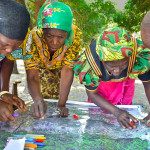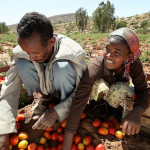View original announcement here: http://www.landesa.org/news/landesa-publishes-womens-land-rights-guides-for-development-practicioners/ The Landesa Center for Women’s Land Rights has created four new practice guides, which are practical resources for development practitioners, researchers, lawyers, advocates, and scholars to assess the situation for women’s land rights in three countries: Kenya, Tanzania, and Uganda. They address both the formal legal structure and the customary framework >> Read more
Missing: The Forgotten Women in India’s Climate Plans — new film from CDKN
New film from the Climate & Knowledge Development Network: Missing: The forgotten women in India's climate plans With a rapidly changing climate that is already having massive impacts on Indian people’s daily lives, the absence of policies and plans supporting millions of working women in their ability to deal with these new challenges needs to >> Read more
New technical guide on reducing the gender asset gap through agricultural development
IFPRI has produced a new technical guide, Reducing the Gender Asset Gap through Agricultural Development. This technical guide, an output from IFPRI’s Gender, Agriculture, and Assets Project (GAAP), explains the importance of assets—both tangible such as land, labor, and animals and intangible such as education, financial capital, and social networks—for development, and the wide gap that >> Read more
Launch of online portal for Gender and Social Inclusion Toolbox
Earlier this year, the CGIAR Research Program on Climate Change, Agriculture and Food Security (CCAFS) together with partners, launched a Gender and Social Inclusion Toolbox for development research via a live-streamed event. We’ve now put the final touches on a platform dedicated to the toolbox, found here, which we encourage you to check out! Here >> Read more
Gender Methods Seminar today: Measuring Women’s Empowerment in Rural India Using Vignettes
Slides from the presentation are available at the end of this post. Abstract: Many development projects have empowerment as one of their goals or as a means to achieve other development goals. Yet, the measurement of empowerment has proved very difficult and is riddled with technical and conceptual problems. Current approaches to measurement of empowerment rely >> Read more
Monitoring and mitigating gender-based violence within non-GBV sectoral programming
CARE has just released Guidance for Gender Based Violence (GBV) Monitoring and Mitigation within Non-GBV Focused Sectoral Programming. This document aims to address the increasing demand for clear guidance on how to practically and ethically monitor and mitigate gender-based violence (GBV) within non-emergency, international development programming, in which GBV is not a specific programmatic component. >> Read more
World Bank publication on Voice and Agency available for download
The World Bank Group has released for purchase and free download its groundbreaking report Voice and Agency: Empowering Women and Girls for Shared Prosperity. The 2012 report recognized that expanding women's agency - their ability to make decisions and take advantage of opportunities is key to improving their lives as well as the world. This report >> Read more
Using participatory mapping with a gender lens to understand how landscapes are used for nutrition
Many rural people derive their sustenance from sources embedded in their landscape – the cropland, pasture, trees, forests and rivers of their surroundings. The diversity of food in people's diets can be closely linked to how people manage the landscape. Yet there are often significant differences in how men and women interact with the landscape. >> Read more
New blog: EnGendering Data
The CGIAR Research Program on Policies, Institutions, and Markets (PIM) has launched a new blog on collecting sex-disaggregated data. Two gender researchers from PIM, Cheryl Doss, an economist at Yale University, and Caitlin Kieran, Senior Research Assistant on gender for PIM at the International Food Policy Research Institute (IFPRI), explain what they hope to accomplish by creating >> Read more
New online course on gender-sensitive governance: what does it look like and how can we work towards it?’
This free web-based course offered by BRIDGE, Institute of Development Studies, and the Gender Hub provides participants with a general grounding in the current concepts of governance from a gender perspective and offers some examples and resources for applying these within key governance institutions, with a focus on governments. Course objectives: Why does gender matter for governance? How >> Read more
- « Previous Page
- 1
- …
- 17
- 18
- 19
- 20
- 21
- …
- 74
- Next Page »


